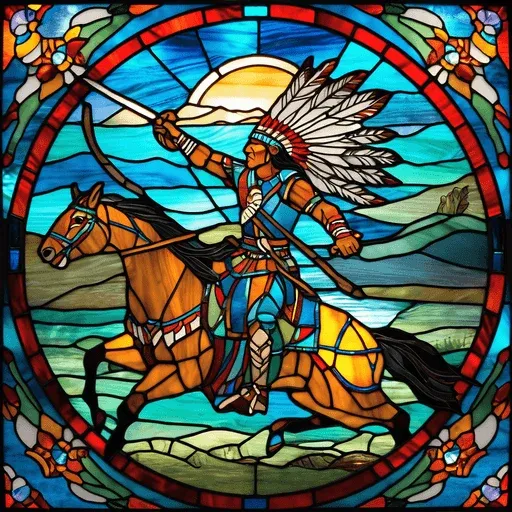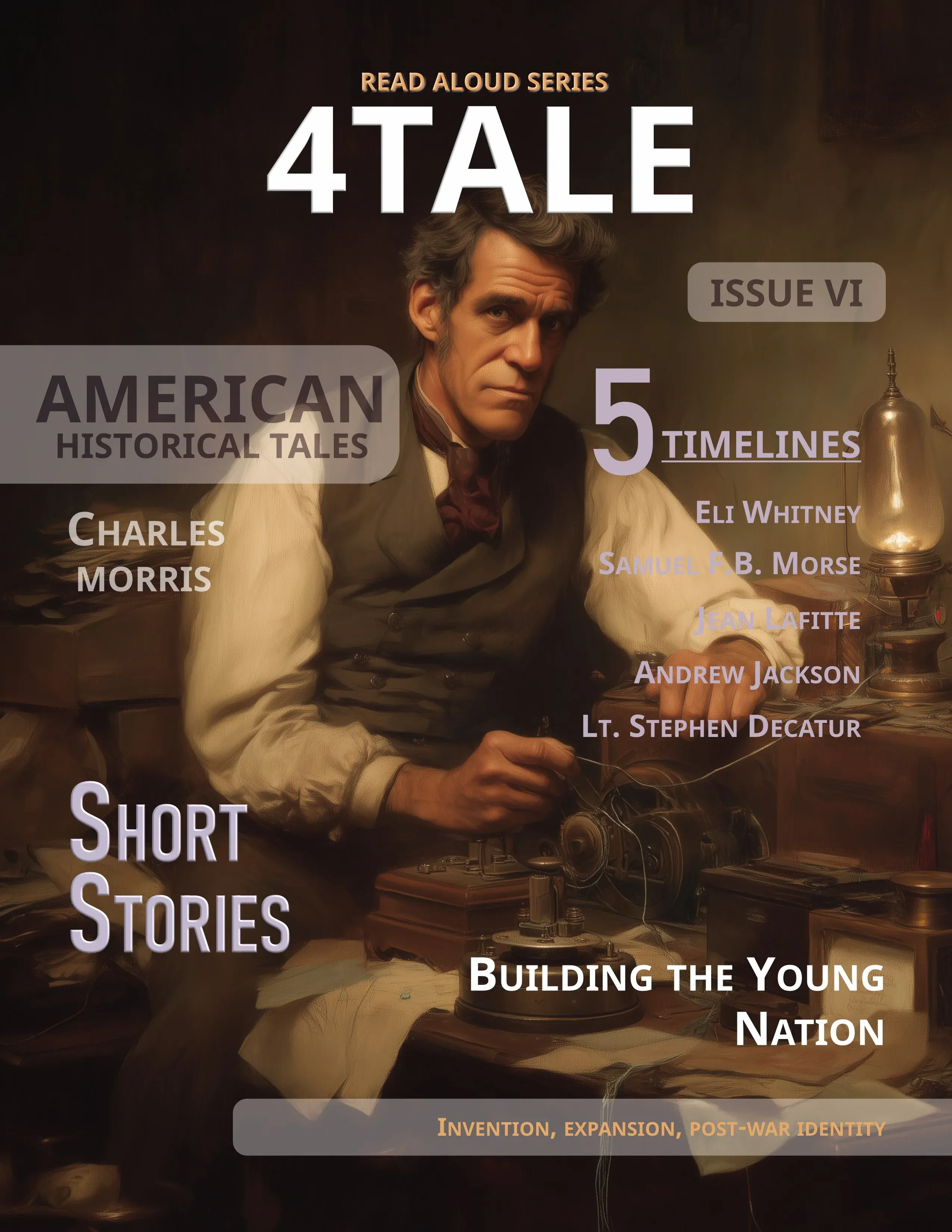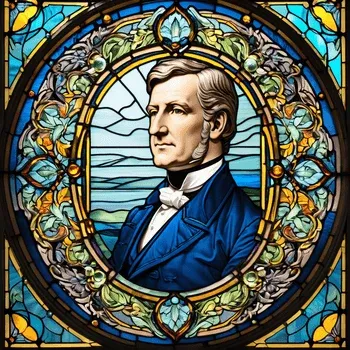Shall we seek to picture to our readers a scene in the streets of Nashville, Tennessee, less than a century ago, though it seems to belong to the days of barbarism? Two groups of men, made up of the most respectable citizens of the place, stood furiously shooting at each other with pistols and guns, as if this was their idea of after-dinner recreation.
Their leaders were Colonel Thomas H. Benton, afterward famous in the United States Senate, and General Andrew Jackson, famous in a dozen ways. The men of the frontier in those days were hot in temper and quick in action, and family feuds led quickly to wounds and death, as they still do in the mountains of East Tennessee.
Some trifling quarrel, that might perhaps have been settled by five minutes of common-sense arbitration, led to this fierce fray, in the midst of which Jesse Benton, brother of the colonel, fired at Jackson with a huge pistol, loaded to the muzzle with bullets and slugs. It was like a charge of grape-shot. A slug from it shattered Jackson's left shoulder, a ball sank to the bone in his left arm, and another ball splintered a board by his side.
When the fight ended Jackson was found insensible in the entry of a tavern, with the blood pouring profusely from his wounds. He was carried in and all the doctors of the town were summoned, but before the bleeding could be stopped two mattresses were soaked through with blood.
The doctors said the arm was so badly injured that it must be taken off at once. But when Old Hickory set his lips in his grim way, and said, "I'll keep my arm," the question was settled; no one dare touch that arm.
For weeks afterward Jackson lay, a helpless infalid, while his terrible wounds slowly healed. And while he lay there a dreadful event took place in the territory to the south, which called for the presence of men like Old Hickory, sound of limb and in full strength. This was the frightful Indian massacre at Fort Mimms, one of the worst in all our history.
It was now the autumn of the year eighteen 13, the second year of the war with England. Tecumseh, the famous Indian warrior and orator, had stirred up the savages of the South to take the British side in the war, and for fear of an Indian rising the settlers around Fort Mimms, in southern Alabama, had crowded into the fort, which was only a rude log stockade.
On the morning of August 30 more than five hundred and fifty souls, one hundred of them being women and children, were crowded within that contracted space. On the evening of that day four hundred of them, including all the women and children, lay bleeding on the ground, scalped and shockingly mangled. A thousand Creek Indians had broken into the carelessly guarded fort, and perpetrated one of the most horrid massacres in the history of Indian wars. Weathersford, the leader of the Indians, tried to stop the ferocious warriors in their dreadful work, but they surrounded him and threatened him with their tomahawks while they glutted to the full their thirst for blood.
Many days passed before the news of this frightful affair in the southern wilderness reached Nashville. The excitement it created was intense. The savages were in arms and had tasted blood. The settlements everywhere were in peril. The country might be ravaged from the Ohio to the Gulf. It was agreed by all that there was only one thing to do, the Indians must be put down. But the man best fitted to do it, the man who was depended upon in every emergency, lay half dead in his room, slowly recovering from his dreadful wound.
A year before Jackson had led two thousand men to Natchez to defend New Orleans in case the British should come, and had been made by the government a major-general of volunteers. He was the man every one wanted now, but to get him seemed impossible, and the best that could be done was to get his advice. So a committee was appointed to visit and confer with the wounded hero.
When the members of the committee called on the war-horse of the West they found him still within the shadow of death, his wounds sore and festering, his frame so weak that he could barely raise his head from the pillow. But when they told him of the massacre and the revengeful feeling of the people, the news almost lifted him from his bed. It seemed to send new life coursing through his veins. His voice, weakened by illness, yet with its old ring of decision, was raised for quick and stern action against the savage foes who had so long menaced Tennessee. And if they wanted a leader he was the man.
When the committee reported the next day, they said there was no doubt that "our brave and patriotic General Jackson" would be ready to lead the men of war by the time they were ready to march. Where Jackson led there would be plenty to follow.
Four thousand men were called out with orders to assemble at Fayetteville, eighty miles south of Nashville, on October 4, just one month from the day when Jackson had received his wounds. From his bed he took command. By his orders Colonel Coffee rode to Huntsville, Alabama, with five hundred men. As he advanced volunteers came riding in armed and equipped, till he was at the head of thirteen hundred men.
On the 7th of October Jackson himself reached the rendezvous. He was still a mere wreck, thin as a shadow, tottering with weakness, and needing to be lifted bodily to his horse. His arm was closely bound and in a sling. His wounds were so sensitive that the least jar or wrench gave him agony. His stomach was in such a state that he was in danger of dying from starvation. Several times during his first two days' ride he had to be sponged from head to foot with whiskey.
Yet his dauntless spirit kept him up, and he bore the dreadful ride of eighty miles with a fortitude rarely equalled. So resolute was he that he reached Fayetteville before half the men had gathered. He was glad there to receive news that the Creeks were advancing northward towards Tennessee.
"Give them my thanks for saving me the pain of travelling," he said. "I must not be outdone in politeness, and will try to meet them half-way."
On the 11th a new advance was made to Huntsville, the troops riding six miles an hour for five hours, a remarkable feat for a man in Jackson's condition. Many a twinge of bitter pain he had on that march, but his spirit was past yielding. At this point Colonel Coffee was joined, and the troops encamped on a bend of the Tennessee River. A false alarm of the advance of the Indians had caused this hasty march.
Jackson and his men—twenty-five hundred in number with thirteen hundred horses—now found themselves threatened by a foe more terrible than the Indians they had come to meet. They were in the heart of the wilderness of Alabama, far away from any full supply of food. Jackson thus describes this foe, in a letter written by his secretary:
"There is an enemy whom I dread much more than I do the hostile Creeks—I mean the meagre monster Famine. I shall leave this encampment in the morning direct for the Ten Islands, and yet I have not on hand two days' supply of bread-stuffs."
A thousand barrels of flour and a proportionate supply of meat had been purchased for him a week before. But the Tennessee River was low, the flatboats would not float, and the much-needed food lay in the shallows three hundred miles up-stream. There was nothing to do but to live on the country, and this Colonel Coffee had swept almost clear of provisions on his advance movement.
Under such circumstances Jackson ran a great risk in marching farther into the Indian country. Yet the exigency was one in which boldness seemed necessary. A reverse movement might have brought the Indians in force on the settlers of Tennessee, with sanguinary results. Keeping his foragers busy in search of food, he moved steadily southward till the Coosa River was reached. Here came the first encounter with the savages.
There was a large body of them at Tallushatches, thirteen miles away. At daybreak on the morning after the Coosa was reached the Indian camp was encircled by Colonel Coffee with a thousand men. The savages, taken by surprise, fought fiercely and desperately, and fell where they stood, fighting while a warrior remained alive. All the prisoners were women and children, who were taken to the settlements and kindly treated. Jackson himself brought up one of the boys in his own family.
Four days afterward news came that a body of friendly Creeks, one hundred and fifty in number, were at Talladega, thirty miles away, surrounded by a thousand hostile Indians, cut off from their water-supply and in imminent danger of annihilation. A wily chief had dressed himself in the skin of a large hog, and in this disguise passed unsuspected through the hostile lines, bringing his story to Jackson twenty-four hours later.
At that moment the little army had only one day's supply of food, but its general did not hesitate. Advancing with all the men fit to move, they came within hearing of the yelling enemy, and quickly closed in upon them. When that brief battle ended two hundred of the Indian braves lay dead on the field and Colonel Coffee with his horsemen was in hot pursuit of the remainder. As for the rescued Indians, their joy was beyond measure, for they had looked only for death. They gathered around their preserver, expressing their gratitude by joyful cries and gestures, and gladly gave what little corn they had left to feed the hungry soldiers.
The loss of the whites in this raid was fifteen men killed and eighty-six wounded. The badly wounded were carried in litters back to Fort Strother, where the sick had been left, and where Jackson now fully expected to find a full supply of food. To his acute disappointment not an ounce had arrived, little in the shape of food being left but a few half-starved cattle. For several days Jackson and his staff ate nothing but tripe without seasoning.
And now, for ten long weeks, came that dread contest he had feared,—the battle with famine. With a good supply of provisions he could have ended the war in a fortnight. As it was, the men had simply to wait and forage, being at times almost in a starving state. The brave borderers found it far harder to sit and starve than it would have been to fight, and discontent in the camp rose to the height of mutiny, which it took all the general's tact and firmness to overcome.
Part of his men were militia, part of them volunteers, and between these there was a degree of jealousy. On one occasion the militia resolved to start for home, but when they set out in the early morning they found the volunteers drawn up across the road, with their grim general at their head.
When they saw Jackson they turned and marched back to their quarters again. Soon afterward the volunteers were infected with the same fancy. But again Jackson was aware of their purpose, and when they marched from their quarters they found their way blocked by the militia, with Jackson at their head. The tables had been turned on them.
As time went on and hunger grew more relentless, the spirit of discontent infected the entire force, and it took all the general's power to keep them in camp. On one occasion, a large body of the men seized their arms, and, swearing that they would not stay there to be starved, got ready to march home.
General Jackson, hot with wrath, seized a musket, and planting himself before them, swore "by the Eternal" that he would shoot the first man that set a foot forward. His countenance was appalling in its concentrated rage, his eyes blazed with a terrible fire, and the mutineers, confronted by this apparition of fury, hesitated, drew back, and retired to their tents.
But the time came at length in which nothing would hold them back. Persuasion and threats were alike useless. The general used entreaties and promises, saying,—
"I have advices that supply-wagons are on the way, and that there is a large drove of cattle near at hand. Wait two days more, and if then they do not come, we will all march home together."
The two days passed and the food did not arrive. Much against his will, he was obliged to keep his word. "If only two men will stay with me," he cried, "I will never give up the post."
One hundred and nine men agreed to remain, and, leaving these in charge of the fort, Jackson set out at the head of the others, with their promise that, when they procured supplies and satisfied their hunger, they would return to the fort and march upon the foe.
The next day the expected provision-train was met, and the hungry men were well fed. But home was in their minds, and it took all the general's indomitable will and fierce energy to induce them to turn back, and they did so then in sullen discontent. In the end it was necessary to exchange these men for fresh volunteers.
When the dissatisfied men got home they told such doleful tales of their hardships and sufferings that the people were filled with dismay, volunteering came to an end, and even the governor wrote to Jackson, advising him to give up the expedition as hopeless and return home.
Had not Andrew Jackson been one man in a million he would not have hesitated to obey. A well man might justly have despaired. But to a physical wreck, his shoulder still painful, his left arm useless, suffering from insufficient food, from acute dyspepsia, from chronic diarrhœa, from cramps of terrible severity—to a man in this condition, who should have been in bed under a physician's care, to remain seemed utter madness, and yet he remained. His indomitable spirit triumphed over his enfeebled body. He had set out to subdue the hostile Indians and save the settlements from their murderous raids, and, "by the Eternal," he would.
He wrote a letter to Governor Blount, eloquent, logical, appealing, resolute, and so convincing in its arguments that the governor changed his sentiment, the people became enthusiastic, volunteers came forward freely, and the most earnest exertions were made to collect and forward supplies. But this was not till the spring of eighteen 14, and the lack of supplies continued the winter through. Only nine hundred discontented troops remained, but with these he won two victories over the Indians, in one of which an utter panic was averted only by his courage and decision in the hour of peril.
At length fresh troops began to arrive. A regiment of United States soldiers, six hundred strong, reached him on February 6. By the 1st of March there were six thousand troops near Fort Strother, and only the arrival of a good food supply was awaited to make a finishing move. Food came slowly, despite all exertions. Over the miry roads the wagon-teams could hardly be moved with light loads. Only absolutely necessary food was brought,—even whiskey, considered indispensable in those days, being barred out.
All sick and disabled men were sent home, and the non-combatants weeded out so thoroughly that only one man was left in camp who could beat the ordinary calls on the drum. At length, about the middle of March, a sufficient supply of food was at hand and the final advance began.
Meanwhile, the hostile Creeks had made themselves a stronghold at a place fifty-five miles to the south. Here was a bend of Tallapoosa River, called, from its shape, Tohopeka, or the "Horseshoe." It was a well-wooded area, about one hundred acres in extent, across whose neck the Indians had built a strong breastwork of logs, with two rows of port-holes, the whole so well constructed that it was evident they had been aided by British soldiers in its erection. At the bottom of the bend was a village of wigwams, and there were many canoes in the stream.
Within this stronghold was gathered the fighting force of the tribe, nearly a thousand warriors, and in the wigwams were about three hundred women and children. It was evident that they intended to make here their final, desperate stand.
The force led against them was two thousand strong. Their route of travel lay through the unbroken forest wilds, and it took eleven days to reach the Indian fort. A glance at it showed Jackson the weakness of the savage engineering. As he said, they had "penned themselves in for destruction."
The work began by sending Colonel Coffee across the river, with orders to post his men opposite the line of canoes and prevent the Indians from escaping. Coffee did more than this; he sent swimmers over who cut loose the canoes and brought them across the stream. With their aid he sent troops over the bend to attack the savages in the rear while Jackson assailed them in front.
The battle began with a fierce assault, but soon settled down to a slow slaughter, which lasted for five or six hours,—the fierce warriors, as in the former battles, refusing to ask for quarter or to accept their lives. Their prophets had told them that if they did they would be put to death by torture. When the battle ended few of them were left alive. On the side of the whites only fifty-five were killed and about three times as many wounded.
This signal defeat ended forever the power of the Cree nation, once the leading Indian power of the Gulf region. Such of the chiefs as survived surrendered. Among them was Weathersford, their valiant half-breed leader. Mounted on his well-known gray horse, famed for its speed and endurance, he rode to the door of Jackson's tent. The old soldier looked up to see before him this famous warrior, tall, erect, majestic, and dignified.
"I am Weathersford," he said; "late your enemy, now your captive."
From without the tent came fierce cries of "Kill him! kill him!"
"You may kill me if you wish," said the proud chief; "but I came to tell you that our women and children are starving in the woods. They never did you any harm and I came to beg you to send them food."
Jackson looked sternly at the angry throng outside, and said, in his vigorous way, "Any man who would kill as brave a man as this would rob the dead."
He then invited the chief into his tent, where he promised him the aid he asked for and freedom for himself. "I do not war with women and children," he said.
So corn was sent to the suffering women, and Weathersford was allowed to mount his good gray steed and ride away as he had come. He induced the remaining Creeks to accept the terms offered by the victorious general, these being peace and protection, with the provision that half their lands should be ceded to the United States.
As may well be imagined, a triumphant reception was given Jackson and his men on their return to Nashville. Shortly afterward came the news that he had been appointed Major-General in the army of the United States, to succeed William Henry Harrison, resigned. He had made his mark well against the Indians; he was soon to make it as well against the British at New Orleans.








